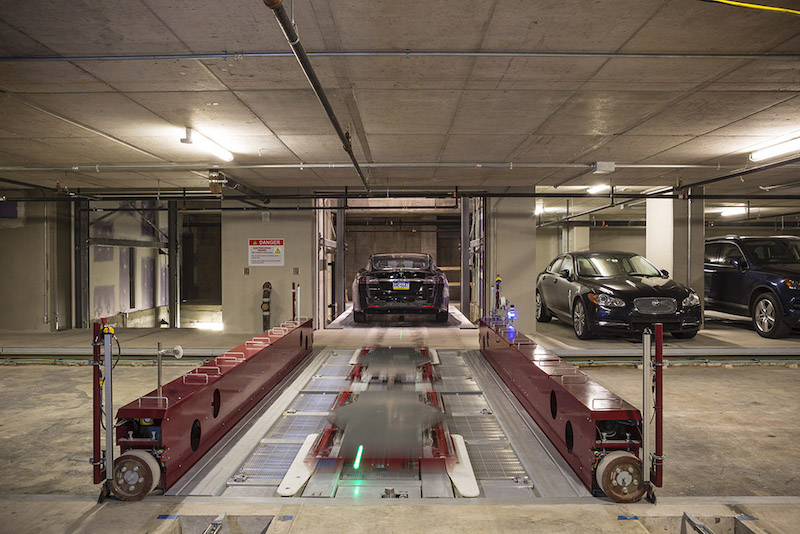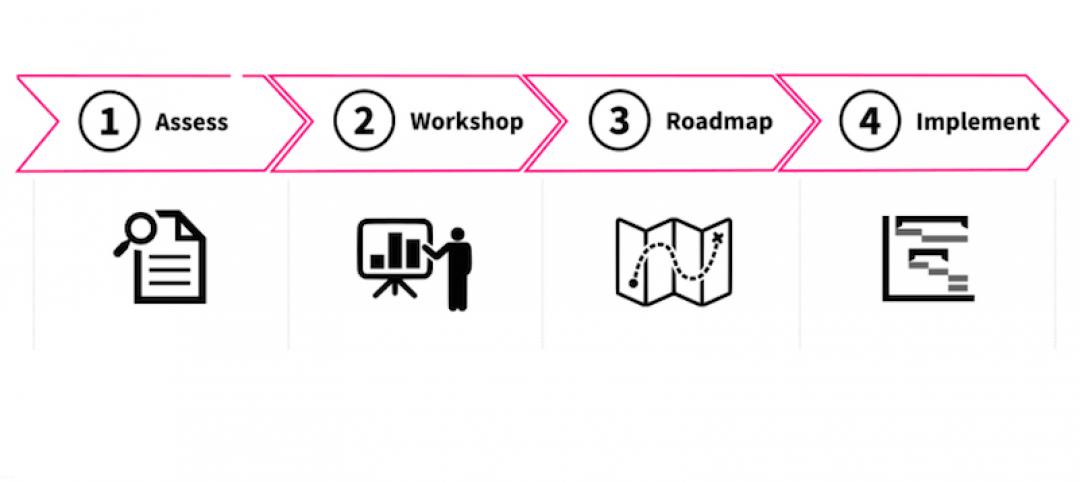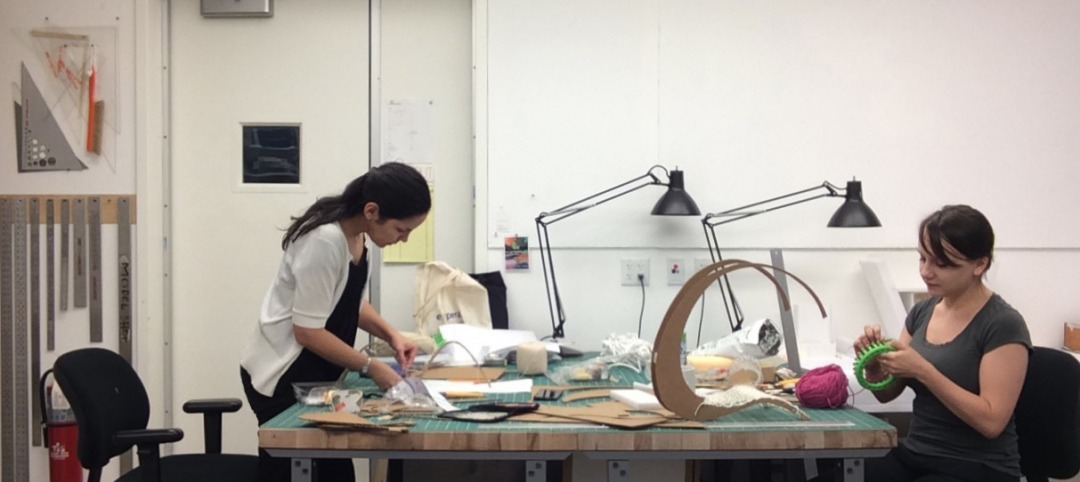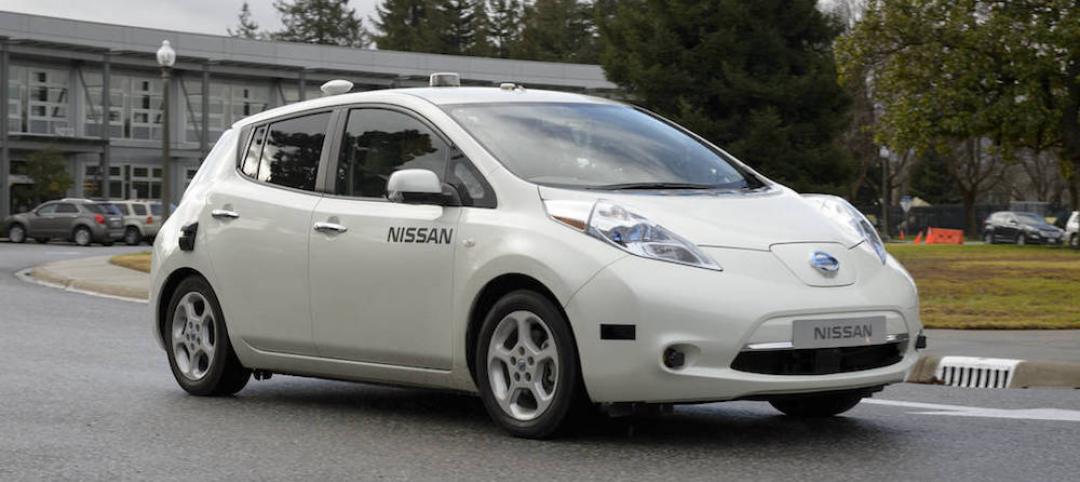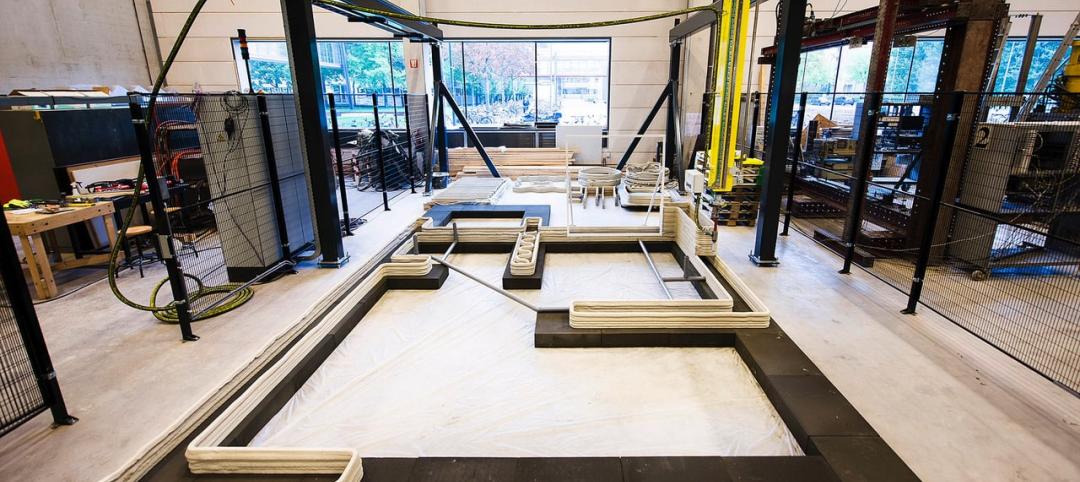500 Walnut is a 26-story luxury condo building with 35 residences whose selling prices average $5 million, the highest in Philadelphia to date, according to the building’s developer Scannapieco Development Corporation (SDC)
The tower—designed by Cecil Baker + Partners and built by Intech Construction—includes all of the high-end amenities one might expect, such as a heated pool, fitness center, dog grooming, massage room and sauna, and “outdoor retreat.” And then there’s something entirely different: an automated palletless parking system with 86 parking slots, far more than this building could have accommodated had it gone instead with a more conventional alternative.
“This amenity adds a level of convenience that no other building can,” says Tom Scannapieco, SDC’s owner.
How the automated parking system works
The system, installed by Westfalia Technologies of York, Pa., works like this: The resident drives into the building through a street-level bay door that he or she opens electronically via a transponder attached to the car’s grill or bumper. The driver enters a covered auto court—a kind of lobby, says Scannapieco—and then places the car into a transfer “cabin.” Drivers and passengers get out, and proceed to a kiosk into which the resident scans a key fob to answer a few safety questions on a touch screen—are the car doors shut, is the parking brake engaged, is the engine turned off, etc.—that the parking control system evaluates prior to storage.
A lift within the cabin lowers the car to the basement level, where the vehicle is then positioned onto a palletless transfer platform, which Westfalia’s Satellite (R) technology adjusts for the length of the car’s wheelbase. That platform rotates the vehicle 180 degrees so it can be easily driven out when retrieved, and then moves the car into the nearest parking slot.
When drivers need their vehicles, they can scan their fob either in the building’s elevator or at the kiosk, and the system automatically brings the car back to the transfer cabin. (The lobby kiosk notes the car’s position and expected retrieval time.)
500 Walnut has two transfer areas and two transfer platforms. Residents have 24/7 access to this system. There’s negligible risk of vehicle damage, theft, or break-in because there’s no reason for humans to be in the actual parking area.
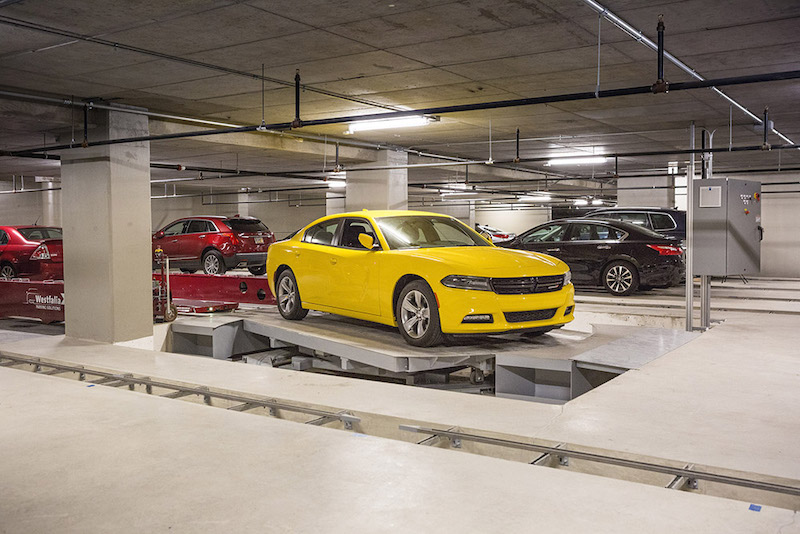
The automated system rotates the car before it's parked, so that it can be easily driven out of the garage upon driver retrieval. Image: Courtesy of Westfalia Technologies
How much does all this cost? Scannapieco and Ian Todd, Westfalia’s director of Automated Parking Systems, didn’t answer that question directly. On a per-sf basis, 500 Walnut’s 50,840-sf garage with state-of-the-art technology and mechanicals cost double a conventional parking garage, Scannapieco estimates.
But he’s quick to note that on a per-car basis, “there’s no premium,” basing that assessment on the fact that a conventional parking ramp system, with fire protection and ventilation included, would have been impossible to pull off within a building this size, to say nothing of the number of parking slots that Westfalia’s solution provided.
“By having this technology, we’re doubling our parking yield,” says Scannapieco. Todd adds that the developer saved money on excavation, and increased the value of its residential units by enhancing the user’s experience. (Scannapieco says the parking garage has become the most popular amenity in the building.)
500 Walnut opened in early 2018. Westfalia is currently installing its second palletless parking system, with 160 parking slots, in another building about a mile from 500 Walnut. That building is scheduled to open next year. Westfalia also installs palleted systems, but Todd is convinced that the newer technology will catch on as more developers and prospective owners become aware of it.
He adds, parenthetically, that while an automated palletless parking system could be installed in an existing building, there are far greater efficiencies when that system is part of a building’s original design.
Related Stories
| Jan 24, 2017
BD+C Accelerate Live! AEC Innovation Conference
Building Design+Construction's inaugural Accelerate Live!
AEC Tech | Dec 22, 2016
The success of your data strategy depends on healthy business practices
Data and digital tools are an absolute given to today’s building design and construction process. But creating a true data-driven workflow requires more than just a solid strategy, writes Proving Ground’s Nathan Miller.
AEC Tech | Dec 18, 2016
Customized future weather data now available for online purchase
Simulation tool, developed by Arup and Argos Analytics, is offered to help owners and AEC firms devise resilience strategies for buildings.
Virtual Reality | Nov 16, 2016
Converting 3D model files to VR, with one click
IrisVR offers two new products to simplify and enhance the application of virtual reality for designing projects.
AEC Tech | Sep 6, 2016
Innovation intervention: How AEC firms are driving growth through R&D programs
AEC firms are taking a page from the tech industry, by infusing a deep commitment to innovation and disruption into their cultural DNA.
Hardware | Aug 11, 2016
Kyocera introduces the DuraForce PRO, a rugged smartphone equipped with an HD action camera (UPDATED)
The Super Wide View HD Action Camera and rugged design allow users to capture their adventures on land, air, or sea.
AEC Tech | Jun 27, 2016
If ‘only the paranoid survive,’ what does it take to thrive?
“Sooner or later, something fundamental in your business world will change.” The late Andrew Grove (1936-2016), Co-founder of tech giant Intel Corp., lived by these words.
AEC Tech | Jun 17, 2016
Driverless cars could soon start impacting commercial, retail project design
Offsite parking and more space for valet parking lines are among the foreseeable changes.
3D Printing | Jun 14, 2016
By 2021, 3D concrete printing is projected to be a $56.4 million industry
The 3D concrete printing industry is expected to more than double in size within the next five years.
BIM and Information Technology | Jun 13, 2016
The race to digitize the globe with 3D imagery
Tech firms are creating a highly-detailed virtual planet available instantly for those who would like to scrutinize it. SmithGroupJJR's Stephen Conschafter details the new technologies being used to map our world.


